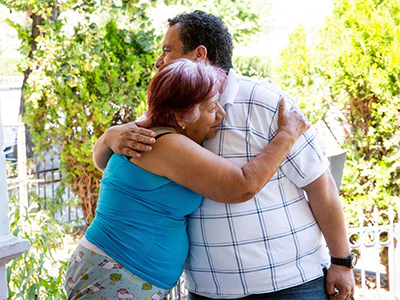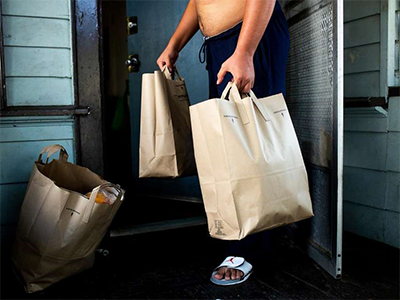In the subterranean hallway of a San Jose apartment building, pastor Gerardo Vazquez knocks on a door decorated with a Feliz Navidad sign from a Christmas long ago. Eva Martinez, a small, grandmotherly woman with red dye covering the tips of her white hair, welcomes him into a space no larger than a college dorm room that she shares with her daughter and several grandchildren.
Gerardo Vazquez is a pastor at of San Jose First United Methodist Church. The church hosts a food program, Open Pantry, where food donations are processed and organized into grocery bags every Wednesday and delivered to those in need. Vazquez-Padilla also hosts a community dinner every Thursday to nurture a strong community.
The pastor hands Martinez a paper bag full of dried beans, rice, pasta, bread and canned fruit, and she shows him her makeshift kitchen: a slow cooker bubbling with beans on a rolling cart squeezed next to a hand sink and refrigerator. Her young grandson lies on a bunk bed playing a video game.
"When I see their faces that reminds me of myself," Vazquez says of the children he sees on his rounds.
 |
| Pastor Gerardo Vazquez delivers grocery bags to families in need on Wednesday, Aug. 1, 2018, in San Jose, Calif. |
The pastor, 46, leads a food ministry every week with members. They pack and deliver free groceries to 87 families, or about 400 people, in the area who don't have enough to eat. Many have undocumented family members or are working toward a green card and tell Vazquez they are afraid to go to the food bank or to apply for food stamps. They've heard rumors they could be targeted by immigration authorities if they do.
Vazquez left everything behind in Mexico to come here and tend to some of the Bay Area's neediest families. It's possible that no one else could perform this role like he does. His own experience of hunger as a child, and later overwhelming loss and sadness, called him and readied him.
"I have many, many sad stories in my life," says Vazquez, sighing. "I know how it feels to be in all these troubles."
The church's food ministry started about four years ago when Vazquez, along with outreach programs director Ray Castellon and minister Shinya Goto, canvassed the neighborhoods surrounding the church to see what families needed most.
Besides rent, paying for groceries was the biggest issue, they said.
In addition to shunning food banks, Vazquez says, many newly arrived immigrant families don't apply for the Supplemental Nutrition Assistance Program (SNAP), or food stamps, even if they are eligible.
 |
| A San Jose man receives donated groceries. | Santiago Mejia / The Chronicle. |
It took time for Vazquez to establish trust with the community. At first no one wanted to answer the door, not sure if it was Immigration and Customs Enforcement knocking. Vazquez took the time to talk to people, to invite them to weekly church dinners and free English classes. They began welcoming him into their homes, serving him homemade tamales, and telling their neighbors.
The ministry grew, even though almost all the participants are Catholic and not sure what to make of the Methodist church. Although many also come to Vazquez's Spanish service on Sundays, most still aren't officially church members.
The church covers the cost of a van to deliver the groceries and some money for the food, and the rest is donated.
"This is really fundamental Christianity in the good sense," says the Rev. Renee Marie Rico, Vazquez's supervisor.
"We can't help everybody, but we can help some families and make a difference for them," Rico says.
Vazquez dreams of teaching others to start similar food ministries at other churches, and he's begun reaching out to Bay Area tech companies for financial support.
When will he know he has helped enough people?
"One thousand," he says solemnly. "I would like to help 1,000 families."
How will he get enough food for so many?
"Little by little," he says.
Tara Duggan, San Francisco Chronicle staff writer
One of seven apportioned giving opportunities of The United Methodist Church, the World Service Fund is the financial lifeline to a long list of Christian mission and ministry throughout the denomination. Through the Four Areas of Focus churches are engaging in ministry with the poor by encouraging churches to be in ministry with their communities in ways that are transformative.





